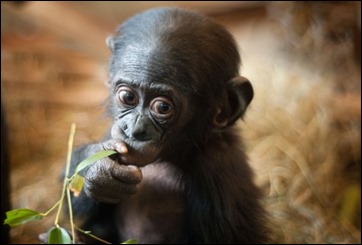Gene sequencing studies reveal that humans, chimpanzees, and bonobos share approximately 99 percent of our DNA. Common sense, then, would suggest that we share numerous personality traits and developmental similarities. And two new studies demonstrate that chimpanzees and humans do, indeed, share distinct personality types and that all three species use similar hand gestures.
Researchers at the Michale E. Keeling Center for Comparative Medicine and Research, University of Texas MD Anderson Cancer Center in Bastrop, Texas, studied 99 captive-born chimpanzees and concluded that they exhibit five distinct personality types: reactivity/undependability, dominance, openness, extraversion, and agreeableness.
Researchers assessed the chimpanzees, who ranged in age from 8 to 48 and had all lived at the facility for at least two years, on a scale consisting of 41 different behaviors, such as boldness, jealousy, friendliness, and stinginess.
Published in the American Journal of Primatology, and reported in Science Daily and The Economist, the researchers found chimpanzees share 60 percent of their personality traits with humans: openness, extraversion, and agreeableness.
Chimpanzees share 60 percent of their personality traits with humans.
“Understanding chimpanzee personality has important theoretical and practical implications,” said Hani Freeman, postdoctoral fellow with the Lester E. Fisher Center for the Study and Conservation of Apes at Lincoln Park Zoo. “From an academic standpoint, the findings can inform investigations into the evolution of personality. From a practical standpoint, caretakers of chimpanzees living in zoos or elsewhere can now tailor individualized care based on each animal’s personality thereby improving animal welfare.”
Preferably, they would use the information to create harmonious groups of retired chimpanzees in sanctuaries instead of helping zoos and amusement parks better control and manipulate the individuals they hold in captivity.
We Share Hand Gestures, Too
 The same common sense that indicated chimpanzees share personality types with humans would also seemingly predict that chimpanzees and bonobos use hand gestures similar to humans to communicate during their developmental stages.
The same common sense that indicated chimpanzees share personality types with humans would also seemingly predict that chimpanzees and bonobos use hand gestures similar to humans to communicate during their developmental stages.
And researchers have, indeed, been comparing the development of hand gestures in chimpanzees, bonobos, and humans. The evidence, they say, points toward the use of these gestures as the early onset of language.
As published in Frontiers of Psychology, the researchers stated, “A basic finding was the functional and formal similarity of many gestures between chimpanzee, bonobo, and human child. The child’s symbols were spoken words; the apes’ symbols were lexigrams – non-iconic visual signifiers.”
“The similarity in the form and function of the gestures in a human infant, a baby chimpanzee, and a baby bonobo was remarkable,” said Patricia Greenfield, professor of psychology at UCLA and co-author of the study.
This evolution of language was present in a common ancestor of humans, chimpanzees, and bonobos.
All three species demonstrated an increase in their use of gestures while developing. However, the human child began to substitute language while the chimpanzee and bonobo continued their use of the lexigrams. The researchers say that this provides evidence that the use of gestures to communicate evolved simultaneously with language.
According to UCLA’s press release announcing the study, “While gesture may be the first step in language evolution, the psychologists also found evidence that the evolutionary pathway from gesture to human language included the ‘co-evolution of gestural and vocal communication.’ Most of the child’s gestures were accompanied by vocalization (non-language sounds); the apes’ gestures rarely were.”
And this, argues Dr. Greenfield, “suggests that the ability to combine gesture and vocalization may have been important for the evolution of language.”
This evolution of language, the scientists conclude, was present in a common ancestor of humans, chimpanzees, and bonobos. Which, says, lead author Kristen Gillespie-Lynch, “provides insight into the communicative potential of our common ancestor.”
So, what at first sight appears to be obvious and intuitive – that humans, chimpanzees, and bonobos, have similar personality types and share the same roots of communications – actually encompasses a much more comprehensive and substantive meaning, and provides further evidence that we should recognize these nonhuman animals as “legal persons” with certain fundamental rights.